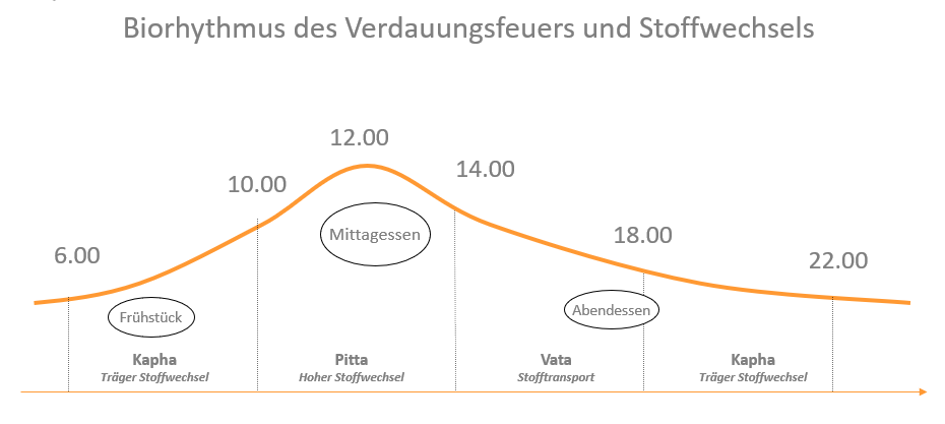Ayurvedic diet
"I can't always eat Ayurvedic food. My job doesn't allow it!" is a statement we often hear from our clients.
What does it mean to eat ayurvedically anyway? Does it mean that you have to eat "Indian" food? Or eat certain foods? The classical texts list Ahara (diet) and Vihara (daily routine) as the most important actions that lead to health and longevity. What are the most important recommendations so that one can say, "I eat Ayurvedic"?
"Let your foods be your remedies." This is the principle coined by the great Greek physician Hippocrates. And it applies without reservation to Ayurvedic nutrition. Three criteria determine whether food is Ayurvedic:
- The quality of the food
- The eating behavior
- The individual tolerance of the food
Quality - organic, regional and seasonally adapted
When does food show high quality? One of the most important quality characteristics is production close to nature. That is why foods from organic farming are optimal. They contain significantly fewer toxic substances than conventionally produced food.
 "Organic food is expensive, I can't afford it!" It is true that organically grown food is a bit more expensive. However, if you shop very consciously and thereby avoid food spoilage and disposal, you may be able to make up for the higher cost.
"Organic food is expensive, I can't afford it!" It is true that organically grown food is a bit more expensive. However, if you shop very consciously and thereby avoid food spoilage and disposal, you may be able to make up for the higher cost.
The Ayurvedic texts also emphasize that regionally available foods and medicinal plants are particularly valuable. In times of global warming, it certainly makes sense to give preference to regional products if they are available in good quality.
The seasons differ in their qualities and have a predominant dosha depending on heat, cold, humidity, dryness, etc. The fruits and agricultural products of each season have a balancing effect on this leading dosha. Therefore, it is also important to eat according to the seasons.
Eating habits
 Digestion begins in the mouth. This crucial fact is unfortunately very often forgotten. Eating quickly in a hectic environment may make you sicker than poor quality food. So chew well! You will then experience the taste of the food much more intensively and also experience your satiety earlier. This allows you to get by with much less food and save money.
Digestion begins in the mouth. This crucial fact is unfortunately very often forgotten. Eating quickly in a hectic environment may make you sicker than poor quality food. So chew well! You will then experience the taste of the food much more intensively and also experience your satiety earlier. This allows you to get by with much less food and save money.
Even well chewed food takes several hours to finish digesting. A strong feeling of hunger is the signal that the body gives us when a meal has been fully processed. Only then should the next meal follow. If you watch yourself closely, you can feel that this process takes 4-6 hours. Since you should only eat during the day, at most three meals fit into one day!
Life without snacks has been proven to be much healthier!
Also, don't forget to drink enough water between meals!
Individual compatibility
Each person has an individual composition of the doshas Vata, Pitta and Kapha, and an individual power of his digestive fire Agni. That is why each person needs an individualized diet. This sounds very complicated. But it is not! Our needs tell us what is good for us and what is not. This is especially true when we are in balance. In this situation, feelings of hunger and appetite/desire for certain foods and tastes show us the way to proper nutrition. .
What happens when we are not in balance, when stress, fatigue or advertising make us believe things that are not good for us? Then we have a strong tendency to eat meals and to adopt eating behaviors that tend to aggravate our discomfort.
How do you get out of such a situation? The best help is Ayurvedic cleansing cures, such as the "herbal detox cure", in order to recognize the healthy needs again by reduction to the essentials and by cleansing the body. Even the healthiest person needs such adjustment of the mind-body system, preferably several times a year! After such a cleansing, correct eating behavior becomes easy again and the selection of suitable food is spontaneously correct.
Procedure in case of food intolerance
If, despite efforts in the direction described above, complaints persist in the digestive system, an individual clarification of food intolerances is recommended. Both Ayurvedic pulse diagnosis and conventional medical tests should guide the way. If the foods filtered out in this way are avoided over a longer period of time, there is a good chance that the digestive system will recover and be able to process previously intolerable foods well again.
Dosha-specific recommendations
With the aging process, with the years of life and with individual stresses, the composition of the doshas changes. Always do a dosha test to find out your dominant dosha. You can then increase your intake of supplements, spices and teas that balance your dosha.
Important information: If you get the most points for Vata in the test, then you should use Vata tea and Vata churna for more well-being. Use Pitta tea and Pitta churna if Pitta is dominant and Kapha tea and Kapha churna if Kapha is predominant.
Read more about dosha-specific recommendations in this blog article: Healthy Eating
Do I need to eat a vegetarian diet?
The Ayurvedic texts also describe very clearly the qualities and effects of a wide variety of animal foods. Vegetarianism in relation to Ayurveda comes from the combination of Ayurveda and yoga. The yogic principle of "do no harm" (ahimsa) suggests abstaining from foods produced by killing other living beings. Depending on how important this principle is to you, you can decide whether or not to consume animal products. .
Summary
To eat Ayurvedic means: I eat as much, in the best quality, in the quantity and with the eating intervals, as is really good for me! The food should be tasty, beneficial and nutritious. Quantity, quality and eating patterns should result in me feeling happy and satisfied, yet light and elated at the end of the meal. This can succeed with a properly dosed Innviertler Jause just as with a smartly spiced vegetarian meal. The main thing is that it suits you!


We look forward to your feedback!